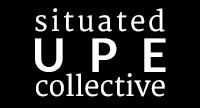As part of the African Centre for Cities‘ International Urban Conference, Kathleen Stokes and Nate Millington organized a series of sessions dedicated to thinking about the relationships between labor, infrastructure, and politics in cities of the global south. We received numerous papers from scholars working in cities all over the world, from Accra to Delhi. Below, we highlight the presentations that were given in order to highlight the work being done by researchers interested in situating urban political ecological research through sustained engagements with cities of the global south.
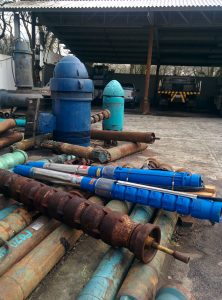 Old engines, pipes, pumps, and cables at a SACMEX workshop. Photograph by Alejandro De Coss.
Old engines, pipes, pumps, and cables at a SACMEX workshop. Photograph by Alejandro De Coss.
In his presentation, Maintaining Mexico City’s Lerma water supply system: an ethnography of labour and infrastructure, Alejandro De Coss (Sociology, London School of Economics and Political Science), looked at the ways in which the Mexico City water system is maintained and repaired. In particular, he focused on the Lerma System, an inter-basin transfer built between 1942 and 1951, which still supplies the city with approximately 14% of its daily water use. During the course of one year, Alejandro worked alongside the repair and maintenance teams of the Mexico City Water System in two different sites. One was the Lerma area, located roughly 50 kms away from downtown Mexico City; the other, the western neighbourhoods of Mexico City itself. There, he could see that the repair and maintenance of this system depends on the ingenuity, creativity, and practical knowledge of the workers. Facing budget cuts, and lacks in materials, tools, and personnel, these workers keep the systems infrastructures running by fixing it through what they call patchwork. This work is one of scavenging, sorting out, and transforming apparent junk into new functional pieces, and, in turn, fixing failing infrastructures – pumps, pipes, wells – with them. Moreover, this repair and maintenance work is also crucial in reproducing the diverse social and material relations that are created through water infrastructures. The processes and politics of water supply, distribution, and appropriation are reproduced too when workers repair and maintain the water system. Through this finding, he calls for a dual attention both to infrastructures and labour when analysing the work that the former do in producing space, society, and their many relations.
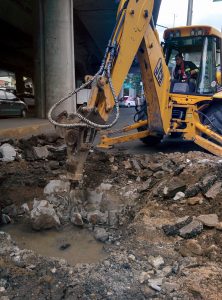 The entrails of the city: fixing a leak in a commercial district in Mexico City. Photograph by Alejandro De Coss.
The entrails of the city: fixing a leak in a commercial district in Mexico City. Photograph by Alejandro De Coss.
In their paper, Imperial remains and imperial invitations: Theorizing fugitivity and raw-life within the infrastructure(s) of African cities, Wangui Kimari (York University and Mathare Social Justice Centre) and Henrik Ernstson (The University of Manchester, KTH Royal Institute of Technology, and University of Cape Town) made two core arguments: first, they emphasized the racial disposability immanent to large-scale infrastructure projects in East Africa. They foregrounded racialization and through this simultaneously traced how empire continues to be made through what they understand as both “imperial remains” and “imperial invitations.” These imperial infrastructural arrangements belie popular notions of colonial rupture and post coloniality. While remains are more explicit reinstantiations of empire, imperial invitations are novel forms where, in the guise of “development,” African countries invite China, Brazil and others to finance, design and develop large scale infrastructure projects. Since these recent invitations are enabled by the skewed power dynamics established in the colonial period and reentrench, in many forms, Africa as pathology, they argued that they are still heavily engaged in perpetuating empire on the continent. Second, while highlighting the “raw life” implicit in these imperial road, rail and communication architectures, they make evident the “fugitive movements” and “genius” of marginalized people to resist, challenge and make evident the “eliminatory logics” of empires over the longue duree.
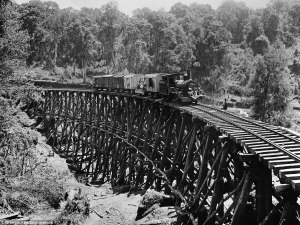 The ‘Lunatic Express’, Kenya’s first train, built by the Imperial British East African Company (IBEAC), circa 1898
The ‘Lunatic Express’, Kenya’s first train, built by the Imperial British East African Company (IBEAC), circa 1898
In their presentation, Uneven Logistics and Labour: Seeking Value in South African Urban Household Recycling, Kathleen Stokes (University of Manchester) and Nate Millington (University of Cape Town) considered different ways that the South African state is attempting to turn recyclables into a source of value throughout the country. They focused on the development of Separation at Source initiatives as well as efforts to incentivize participation in low-income communities. They argue that schemes to unpack value from recyclables are reliant on a series of incentives that in effect generate an economy that requires subsidizing and requires serious state involvement. This has implications for attempts to tie job creation goals to waste, and suggests a kind of structural paradox within the recycling economy. Second, they argue that subsidizing recycling relies on different forms of labour and different subject positions, in particular the idea of the entrepreneurial self. Finally, they argue that in promoting an enabling environment for recycling and job creation, the state seeks to outsource risk and responsibility for service provision/functioning. This means that that state responsibility for waste management increasingly becomes one of oversight, and that infrastructure and labour configurations become the responsibility of others and context specific. This has implications for how we understand the nature of the contemporary state.
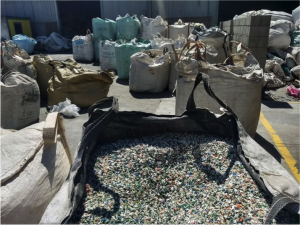 Recycling Plastic in Cape Town, 2017. Photograph by Nate Millington
Recycling Plastic in Cape Town, 2017. Photograph by Nate Millington
Pascale Hofmann (University College London) explored the “dialectics of urban water poverty” through her presentation, Exploring water infrastructure and services through everyday trajectories. Pascale’s research examines how ‘the urban water poor’ move in and out of urban water poverty and how they do so in different ways, exploring the interrelations between policy-driven and everyday practices and their influence on individual trajectories. She adopts a normative perspective based on principles of environmental justice, including distribution, recognition and parity of participation, and applies a relational approach that draws on intersectionality scholarship and emphasises intersections of time, space and socioenvironmental relations. Pascale’s presentation focused on access to water in Dar es Salaam, a city facing growing challenges with the equitable provision of water services. While the actual number of people that gained access in urban areas since 1990 may have increased, in Tanzania the percentage of people with improved access to water has declined. Failure of policy-driven practices (those by government, private sector providers, external support agencies and other key players in infrastructure development) to adequately address urban water poverty has increased the reliance of poor women and men on a range of everyday practices to meet their WSS needs, including community-managed systems and informal private providers.
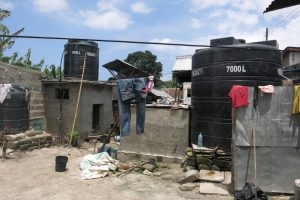 Storing water in Dar es Salaam. Photograph by Pascale Hofmann.
Storing water in Dar es Salaam. Photograph by Pascale Hofmann.
Pascale’s findings confirmed a dialectic relationship between policy-driven and everyday practices with multiple examples where conditions under which urban water poverty prevails are produced, reproduced and normalised. But evidence further shows instances of more transformative practices that challenge unjust processes and outcomes with a potential for people to move out of it. Research findings highlight how spatial and temporal specificity alongside people’s intersectional identities and relations shape individual trajectories and define who can and cannot escape water poverty traps and why. She argues that a relational investigation of urban water poverty trajectories can help tackle the problem by spelling out which factors pull people out of urban water poverty and which ones push them deeper into it.
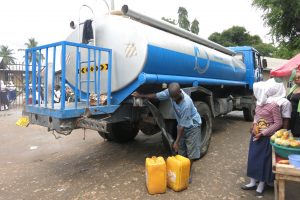 Delivering water in Dar es Salaam. Photograph by Pascale Hofmann.
Delivering water in Dar es Salaam. Photograph by Pascale Hofmann.
Cecilia Alda Vidal (University of Manchester) presented findings from the paper, Mapping operation and maintenance: an everyday analysis of inequalities within piped water supply in Lilongwe, Malawi (written with Maria Rusca and Michelle Kooy). The paper begins from the premise that in Lilongwe, Malawi (along with many other cities), a connection to the water network does not ensure that water will run when one opens the tap. While some users receive water round-the-clock, those located in the Low Income Areas of the city frequently face intermittent supply or lack of water for up to 4-5 days. To explain this situation the authors follow the engineers and operators of the water utility as they conduct daily operational and maintenance work and show how their routines and decisions contribute to produce a highly differentiated service. Inequalities in water distribution are produced and maintained not only through the construction of infrastructure but through its daily operation and maintenance and reflect and reproduce other inequalities within the city.
Jonathan Silver (University of Sheffield) presented his paper from Environment and Planning A – The climate crisis, carbon capital and urbanisation: An urban political ecology of low-carbon restructuring in Mbale. Using the theme of the session to rethink the role of labour in the waste process and the role of workers in contesting low-carbon restructuring in African towns and cities Silver showed that the impact of climate change will not just be in the hazards and risks associated with bio-physical change. Rather precarious workers such as waste-pickers are deemed as blocking progress towards addressing the emergency of climate change and the role of waste in helping to cut carbon emissions. And new forms of infrastructure operation such as in Mbale show that attempts to address the carbon crisis are likely to reinforce existing working conditions and social relations between the poor and global institutions such as the World Bank.
 Collecting waste in Mbale. Photograph by Jonathan Silver.
Collecting waste in Mbale. Photograph by Jonathan Silver.
Joseph Chambers (University of Manchester) explored the role and development of ICT innovation in Nairobi’s energy and water Infrastructure. Like many cities, Nairobi faces a myriad of infrastructural challenges. Recently, greater hope and efforts are being placed in ICT Innovations (ICTIs) helping solve these problems. This digital injection is occurring against a backdrop whereby Kenya has become a central node in the digital globe and active voice in technologically mediated city discussions. Whilst glossy images of new, Kenyan smart cities remain, the everyday metabolisms of Nairobi are being increasingly mediated by ICTIs within urban infrastructure.
Whilst research has explored the development of ICTIs within smart cities of the global North and their incorporation within urban infrastructure, African cities are under-researched. Joseph’s ongoing research, based in Nairobi, examined how these ICTIs have been developed within urban energy and water infrastructure and their impact on the population’s everyday experiences. Focussing on four main projects (Water ATMs, water tank sensors, ethanol and LPG IoT-networks), the research engaged a variety of key agents (designers/engineers/government officials) and stakeholders, whose lives are reconfigured by these ICTIs. Further research is beginning to go into greater depth, exploring how these ICTIs within urban infrastructure are altering the daily lives for numerous citizens.The findings from the research highlight the lessons learnt by home-grown ICTIs, the need to engage and train local populations and the benefits of making ICTIs adaptable. Secondly, the research identified the everyday impacts of these ICTIs including; clearer financial planning, greater time-management in water/fuel collection and greater political representation enabled through ICTIs. Finally, the research examines how these ICTIs have opened up new discourses about the role of informal infrastructures, mediated by digital technologies, within the resilient smart city of the future. As the research continues, new insights will hopefully be uncovered over the coming months.
 Monitoring Water. Image courtesy Kelvin Gacheru (2017) TechWaterSolutions
Monitoring Water. Image courtesy Kelvin Gacheru (2017) TechWaterSolutions
In her presentation drawn from research in South Delhi, Sushmita Pati explored how the field of political economy looks like when we look at it from the ground. She asks, “How does the field of political economy appear in everyday conflicts, negotiations and practices?” In her research and presentation,The Life and Times of Lowly Infrastructure, Sushmita looked at two urban villages ethnographically. She documented their progression since the time of land acquisition to see how networks of caste and kinship become important to sustain the logic of finance, rent market and accumulation, while understanding the urban village as central in this formation. As Delhi needed to expand post-independence, agricultural lands of these villages were acquired in order to make what we know as South Delhi today. The residential lands of the villages were retained, however. Urban villages, as caught in between the expensive localities of South Delhi today are exactly the oxymoron that the terminology reflects. Both these villages are dominated by Jats, traditional landlords, who have been able to make the most of the exponential increase of real estate value. They are therefore villages in the middle of the city where geographies of caste and that of capital get entwined and mapped onto each other. This does not make them unique, as such overlaps exist all over the city space. But studying this form gives us an entry into questions that are beyond the form itself. This research is as much about the villages as it is about the relationship the villages have with the city. These villages have been integrated into the city in ways that are not neat and systematic. This work goes beyond the rural-urban continuum story and look at the ways in which rent figures as central in the postcolonial global cities. Caught in between the ‘city’ and the ‘village’ as a form, these villages have come up as renting spaces for lower middle class new migrants to the city. Erstwhile agrarian-pastoralist landlords begin to emerge as property owners by erecting cheaply constructed buildings meant entirely for renting purposes which Sushmita calls, ‘lowly infrastructures’. These lowly infrastructures are built and sustained through a vernacular form of capital that works as the underbelly of the global capital. Her larger research looks at these very circuits of economy and their presence within global city spaces.
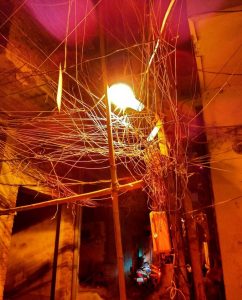 Image courtesy Dwayne Leonard Fernandes
Image courtesy Dwayne Leonard Fernandes
Antje Bruns, Rossella Alba and Lara E. Bartels (all from Universität Trier) presented findings from WaterPower, an on-going collaborative research project that explores the dynamics of urbanization, resource governance, and global environmental change in the Greater Accra Metropolitan Area.
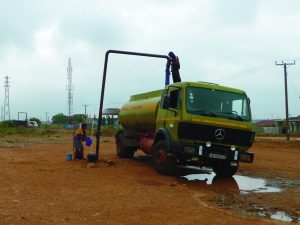 Tanker drivers and residents purchase pipe-born water from a filling point installed by the water utility. Photograph by Rosella Alba.
Tanker drivers and residents purchase pipe-born water from a filling point installed by the water utility. Photograph by Rosella Alba.
Rossella and Lara discussed the role of multiplicity in the production of uneven urban and peri-urban water geographies by bringing together research on the everyday practices of water vending within and outside large-scale networked infrastructure, and research on the strategies put in place by residents to access water and land in peri-urban Accra. By looking at the urban waterscape through the perspectives of water provision and access, their work analyses the relations between different sources of water as well as between multiple infrastructural configurations for urban water provision. This approach contributes to build detailed understandings of the everyday flow of water not only within a neighborhood, or in relation to a particular type of infrastructure but across the city and across multiple delivery configurations. For instance, it shows that groundwater abstraction in peri-urban Accra is a strategy put in place by residents to access water in face of infrastructural deficits as well as a source of water for tanker operators when they are excluded from purchasing pipe-born water from the large scale networked infrastructure run by the city´s public water utility. It makes visible the overlapping roles of residents who are at the same time water providers, customers of the water utility and of water vendors.
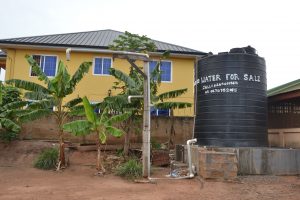 Water selling in peri-urban Accra. Residents set up small scale (ground)water selling facilities in their backyards. Photograph by Rosella Alba.
Water selling in peri-urban Accra. Residents set up small scale (ground)water selling facilities in their backyards. Photograph by Rosella Alba.
Building on the above insights, Antje´s presentation discussed how urban political ecology can contribute to illuminate the contested production of urban environments and move beyond a narrow technical, managerial and state-centric focus in research on urban metabolic relations. She advocated for an approach to metabolic analysis that views the urban environment as a dynamic, nested and co-evolutionary network of complex biosocial and material relations, which in itself shapes how various metabolisms interact across scales. Her presentation illustrated how a metabolic analysis makes visible the interconnections between the uneven flow of water and energy across the GAMA. Drawing from the experience of interdisciplinary research within WaterPower, she emphasized the need for metabolic analysis to remain open to a plurality of different knowledge forms and perspectives, and to remain attentive to the inherently political nature of material and technological phenomena.
